

Philosophy 281: Marxism and Film/ Spring 2012. Philosophy 281: Marxist Philosophy/ Spring 2012. Phil 281. 1.
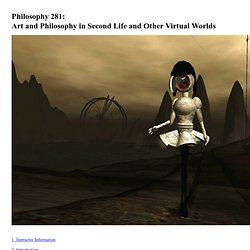
Instructor Information 2, Introduction 3. Caerleon Sims 4. 5. Philosophy 281: Dialectical Cinema/ Fall 2012. Instructor Information.
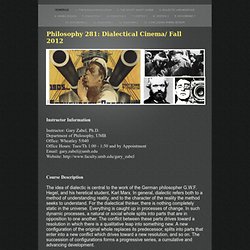
Philosophy 281: Zizek and the Movies / Fall 2011. Philosophy 281Motion, Time, and Memory in the Movies / Spring 2011. Philosophy 281: Philosophy and Film. Marxism and Film. Bodies, Souls, Robots. Bodies, Souls, and Robots Instructor: Gary Zabel, Ph.D.
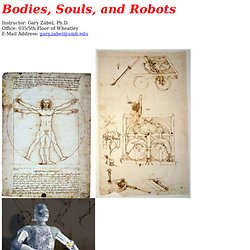
Office: 035/5th Floor of Wheatley E-Mail Address: gary.zabel@umb.edu (From left to right: Vetruvian Man, Programmable Automaton, and Knight-Robot, all by Leonardo Da Vinci) The word "robot" was invented in 1921 by the Czech writer Karel Capek as a name for the artificial humanoids who are the chief characters in his play, R.U.R (Rossum's Universal Robots). Capek coined the name on the basis of the Czech word robota, which roughly means drudgery or servitude, a word appropriate for his dramatic purposes since the robots of his play are industrial slaves who mount a revolution against their human masters. On the one hand, robots, or automata, are artifacts; in other words, they are products of human making. All readings are contained on this CD and are linked to the syllabus. Requirements: There will be a take-home exam and a substantial research paper.
Morals and Law. Instructor: Gary Zabel, Ph.D Philosophy Department Phone: (617) 287-6530 E-mail Address: gary.zabel@umb.edu Website: www.faculty.umb.edu/gary_zabel Office Hours: Wed2:45-3:45/Th 2:45-3:45 Wheatley, 5th Floor, 035 In this class, we will examine three moral frameworks for understanding the law and the role it plays in both national and global society: 1) Natural Law Theory, with its associated doctrine of just and unjust wars; 2) Social Contract Theory, including its expression in American constitutional law, with its emphasis on individual rights and the restraint of state power; and 3) Radical Democratic Theory in relation to the problem of public authority and religious fundamentalism.
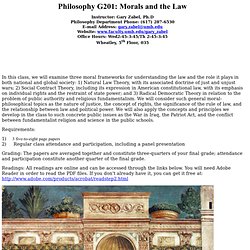
Moral Issues in Medicine. Instructor: Gary Zabel, Ph.D Philosophy Department Phone: (617) 287-6530 E-mail Address: gary.zabel@umb.edu Office Hours: M 2:00-3:00/Wed 2:00-3:00 5th Floor of Wheatley, Room 035 For the past five hundred years, we have lived in a world profoundly shaped by the scientific revolution.
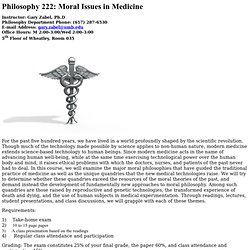
Though much of the technology made possible by science applies to non-human nature, modern medicine extends science-based technology to human beings. Since modern medicine acts in the name of advancing human well-being, while at the same time exercising technological power over the human body and mind, it raises ethical problems with which the doctors, nurses, and patients of the past never had to deal. In this course, we will examine the major moral philosophies that have guided the traditional practice of medicine as well as the unique quandries that the new medical technologies raise. Courses. Parallel Universes. Parallel Universes The Idea of Multiple Worlds in Philosophy, Science, and Science Fiction The idea that our world is one of an unfathomably large, perhaps infinite, number of alternative worlds is an old one.
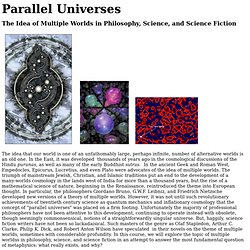
Cosmology. Cosmology and Philosophy Cosmology and Philosophy Instructor: Gary Zabel Office: 035/5th Floor of Wheatley E-Mail Address: gzabel@comcast.net This is the Golden Age of cosmology.
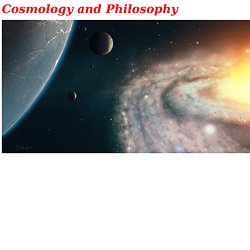
Many scientific advances have converged in the 21st Century to make it so. Einstein's theory of general relativity provided physicists with the conceptual framework necessary to describe the spatial and temporal structure of the universe as a whole. Hubble's discovery of galactic redshift demonstrated that the cosmos is expanding, and that, if we "run the film backwards," we ultimately arrive at a moment when it began. Become conscious of itself in us, or in other intelligent beings? Philosophy of Magic. Philosophy 281: Magic in Renaissance Thought Truth does not come into the world naked, but clothed in figures and images. - The Gospel of Philip (Nag Hammadi Codex 2) Instructor: Gary Zabel, Ph.D Philosophy Department Phone: (617) 287-6530 E-mail Address: gary.zabel@umb.edu Website: www.faculty.umb.edu/gary_zabel Office Hours: Wed 2:45-3:45/Th 2:45-3:45 Wheatley, 5th Floor, 035 Course Description In this course, students will explore the surprisingly central role played by magic and other occult themes in the work of major thinkers of the European Renaissance.
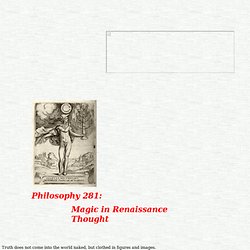
The syllabus is divided into seven main sections: 1) The Philosopher as Magician; 2) Philosophy and the Ancient Mysteries; 3) Real Magic; 4) Theory of Magic; 5) Magic in Botticelli's Paintings; 6) Number Mysticism and the Rise of a Mathematical Science of Nature; and 7) Demonology and the Witch Trials. Requirements Grading Readings All readings are on this CD and can be accessed through the links below. 1.
Iamblichus-Life of Pythagoras. Enter the Gate of Karnak. Philosophy 108: Moral and Social Problems Spring 2013. Grading The course requirements have the following weight in determining the final grade for the course: Attendance, presentations, and participation in discussions = 30% Midterm exam = 30% Final paper = 40% Plagiarism Policy Plagiarism is the presentation of someone else’s work as your own.
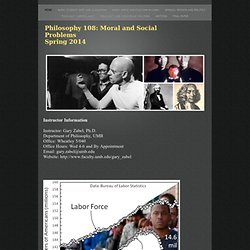
Philosophy 100: Introduction to Philosophy Spring 2013.